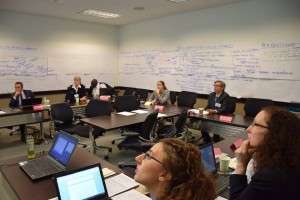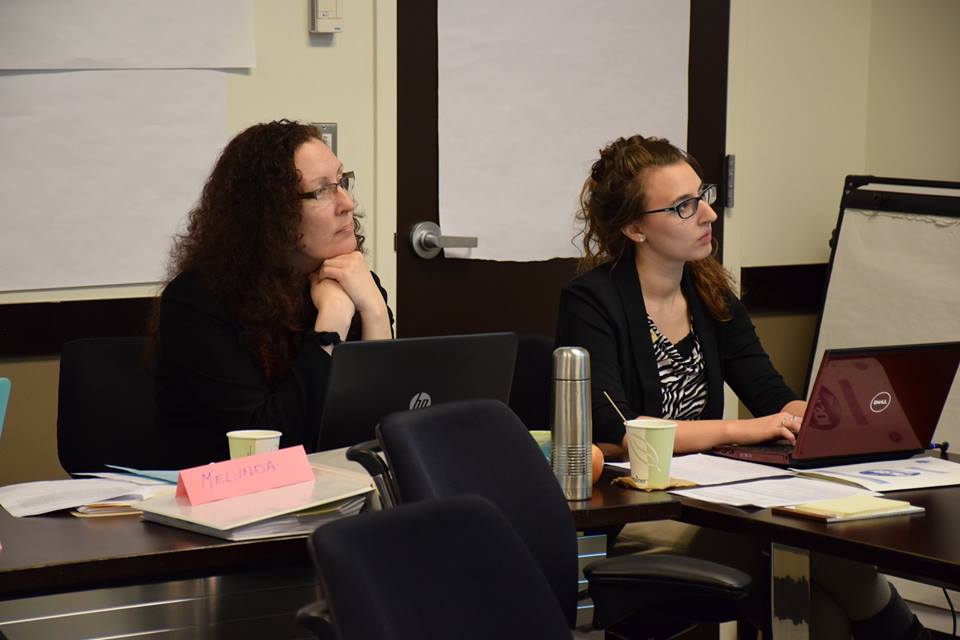When Katrina Gehman began her four-month practicum experience at the U.S. Army Peacekeeping and Stability Operations Institute (PKSOI), she quickly learned that some terms have different meanings in different contexts.
The context she’d been immersed in as a graduate student in the conflict transformation program with the Center for Justice and Peacebuilding (CJP) at Eastern Mennonite University (EMU) was very different than the context of the institute at Carlisle Barracks in Pennsylvania.
“The term ‘peacebuilding,’” she said, “is used frequently at PKSOI, but primarily to refer to activities done ‘post-conflict’ during ‘reconstruction,’ not to refer to activities all through the scale of different stages of conflict. This can make it challenging for stakeholders from dissimilar backgrounds to have productive conversations.”
Monitoring semantics was just one of many skills Gehman practiced during what she calls a “cultural immersion” in the military environment. With her specific interest being the military-peacebuilding nexus in the Middle East and North Africa, Gehman was matched with a project covering the African Union Mission in Somalia. She worked under the supervision of retired Colonel Dwight Raymond, an expert on the protection of civilians in mass atrocities.
The experience gave her a better knowledge of the multi-dimensional, powerful stakeholders who engage in operations of war and peace: the U.S. military, U.S. government agencies, and multinational coalitions.
“I now have a basic familiarity with the principles and processes of United Nations peacekeeping, including issues like mandate implementation, force generation, and logistics for troop-contributing countries,” Gehman said.
The CJP Capstone Project

When it came time to choose her practicum experience, Gehman said applying to PKSOI was a good option to pursue her academic and professional interests. She had previously conducted interviews with veterans, participated in a STAR (Strategies for Trauma Awareness and Resilience) workshop called “The Journey Home from War,” and joined veteran and fellow CJP graduate student Michael McAndrew to raise awareness about suicide among veterans.
Gehman also benefited from CJP’s connections to the institute. Her advisor, professor Barry Hart, had taken students to visit the institute. Additionally, CJP research professor Lisa Schirch has been a guest lecturer at the U.S. Army War College.
“Our faculty have strong connections with peacebuilding organizations around the world,” said program director and professor Jayne Docherty. “This helps our students find placements that fit their particular interests, and build skills and networking contacts.”
Students in CJP’s practice-oriented graduate program in conflict transformation culminate their coursework in one of three options for a capstone project. The organizational practicum, of which Gehman’s experience is an example, requires a 2-4 month commitment. A second option is the research-based practicum, which results in production of an article, book, exhibit or other project. A third option allows full-time CJP students to write a thesis. Students must make a presentation to the CJP community about their project.
2015 CJP Capstone Projects
In addition to Gehman (from Morton, Illinois, and a graduate of Wheaton College), the following graduate students presented capstone projects during the 2015 spring semester. All were awarded their degrees during the April 26 commencement ceremony.
Matt Bucher (Harrisonburg, Virginia; Messiah College, EMU MDiv ’15) researched Anabaptist responses to Christian Zionism and sought to find Christian theology that is good news for Israelis, Palestinians, and Americans. Additionally, he worked at the Fairfield Center in Harrisonburg, connecting with local church leaders and working to understand where and how ministers have developed their ability and skills for addressing congregational conflict. Project title: Pursuing Good Theology and Best Practices: Christian Zionism, Empowering Church Leaders and Self-Reflection.
Ray Garman (Ocean City, New Jersey; Haverford College) conducted independent research on the role that meaningful productivity plays in post-traumatic growth. Project title:A Predicament of Being
Fabrice Guerrier (Port-au-Prince, Haiti; Florida State University) worked in the Advocacy Unit of the United Nations Office of the High Representative for Least Developed Countries, Landlocked Developing Countries and Small Island Developing States (UN-OHRLLS). He focused on research and supporting numerous outreach and advocacy strategies essential to OHRLLS’ implementation of its programs of action, as well as mobilizing international support for the most vulnerable countries. Project title: Advocating for Vulnerable Countries in the 21st Century
Tony Harris (Annapolis, Maryland; Goucher College) worked as the global education graduate associate at the World Affairs Council – Washington, DC. His primary responsibilities included curriculum development and program design/implementation. He was also involved in planning special events and worked on various projects related to organizational development. Through his practicum, Harris also explored explicit and implicit theories of change specific to the organization. Project title: The Global Education-Peacebuilding Nexus: Pedagogies, Programs, and Possibilities
Jacob Kanagy (Elizabethtown, Pennsylvania; Eastern University) served as a congregational consultant and member of a church governance reference team at a community mediation center. His experience led to exploration of the overlap and complexities of serving in both a secular and religious peacebuilding context as a mediator or facilitator. Project title: The Intersection of a Community Mediation Center, Congregational Conflict, and a Church Governance Project
Diane Kellogg (Staunton, Virginia; Geneseo State University) contributed to the development and implementation of the Center for Justice and Peacebuilding’s Women’s Peacebuilding Leadership Program (WPLP). Confident that WPLP was making a greater impact in the participants’ home communities than most people were aware of, Kellogg explored how that impact could be measured and evaluated. Her video production introduced the program and its participants, and reported on the community-level impact of the women’s participation. Project title: Evaluation and Promotion of the Women’s Peacebuilding Leadership Program
Bridget Mullins (Hudson, Ohio; University of Notre Dame) explored the role of theater in visualizing the roots of conflict and re-discovering voice, body, self and the other. In the process, she witnessed communities, both in Harrisonburg and in occupied Palestine, rehearsing the change they want to see in themselves and the world. Project title: Beautiful Resistance: When Words Fail, Art Speaks
Nate Schlabach (Millersburg, OH., Ohio State University) worked in the East-West Center, an organization based in Washington, DC, that promotes better relations and understanding among the people and nations of the United States and the Asia-Pacific region. He was involved in writing, researching, and editing several of the center’s newly released publications on Japan and Australia, and he provided news and analysis for the “Asia Matters For America” website. Project title: The U.S.-Asia Relationship: Why It Matters to America
